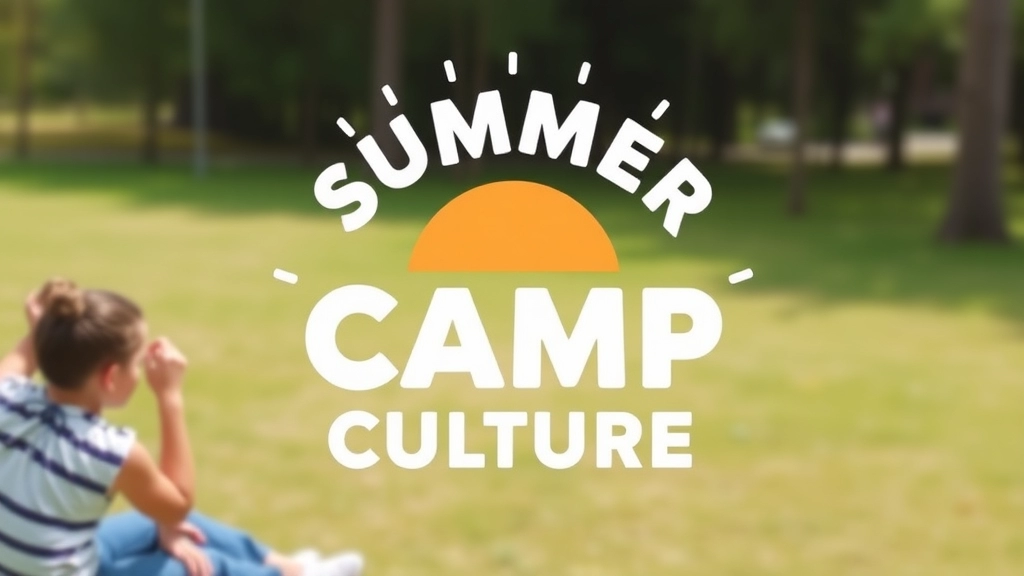Welcome to Our Exploration of “Summer Camp Culture”
Welcome to our exploration of “Summer Camp Culture,” where we delve into the vibrant world of summer camps and their transformative impact on children. From their rich history to the diverse activities and traditions that define them, summer camps offer an unparalleled experience. Whether it’s the thrill of adventure camps or the creativity of arts camps, there’s something for every child to discover and enjoy.
What We’ll Cover
In this article, we’ll uncover the benefits of attending summer camps, the role of counselors, and how technology is shaping the camp experience. We’ll also provide insights into choosing the right camp for your child, preparing them for their first adventure, and understanding the environmental practices that camps are adopting. Join us as we share stories from camp alumni and explore the future trends and innovations in this dynamic culture.
History and Evolution of Summer Camps
Ever wondered how summer camps came to be? Why do we even send our kids off to these places every year? If you’ve got questions like these swirling around, you’re in the right place. Let’s dive into the history and evolution of summer camps.
The Origins: Where It All Began
Summer camps didn’t just pop up out of nowhere. They have a rich history that goes back to the late 19th century. The first recognised summer camp, the Gunnery Camp, was founded in 1861 by Frederick W. Gunn and his wife in Connecticut, USA. It was initially designed to be an educational retreat for boys, focusing on outdoor activities and moral teachings. Imagine a time when kids didn’t have smartphones or video gamesâwhat a different world, right?
The Early 20th Century: Growing Popularity
By the early 1900s, summer camps started gaining traction, especially in North America. Parents were beginning to see the value of sending their children away for a few weeks. It wasn’t just about keeping them busy; it was about building character, learning new skills, and making lifelong friends. Camps started to diversify, offering specialised activities like swimming, hiking, and arts and crafts.
Key Developments:
- 1900s: Introduction of specialised camps focusing on specific activities.
- 1920s: Camps for girls started to emerge, breaking the boys-only tradition.
- 1930s: The Great Depression led to a decline in camp attendance, but many camps adapted by offering scholarships.
Post-WWII Boom: The Golden Age
After World War II, summer camps experienced a golden age. The economic boom allowed more families to afford camp fees, and the concept of summer camp became ingrained in American culture. This period also saw the rise of non-profit and religious camps, catering to a wider range of interests and beliefs.
Highlights:
- 1940s-1950s: Explosion in the number of camps across the United States.
- 1960s: Introduction of co-ed camps, reflecting the changing societal norms.
- 1970s: Environmental education became a core component, thanks to the growing environmental movement.
The Modern Era: Adapting to Change
Fast forward to today, and summer camps have evolved to meet the needs of modern families. Technology, diversity, and inclusivity have become key components. Camps now offer a range of programmes, from adventure and sports to arts and STEM (Science, Technology, Engineering, and Mathematics).
Modern Trends:
- Tech-Free Zones: Many camps promote a digital detox, encouraging kids to unplug and engage with nature.
- Specialised Camps: From coding and robotics to performing arts, there’s a camp for almost every interest.
- Inclusivity: Camps are making efforts to be more inclusive, offering programmes for children with disabilities and those from diverse backgrounds.
Why It Matters
Understanding the history of summer camps helps us appreciate their value. It’s not just about fun and games; it’s about personal growth, building resilience, and creating memories that last a lifetime. When you think about sending your child to camp, you’re not just giving them a break from schoolâyou’re giving them an opportunity to grow in ways that the classroom can’t offer. For more insights on how to make the most out of the camp experience, check out our guide on maximizing your summer camp experience.
Popular Activities at Summer Camps
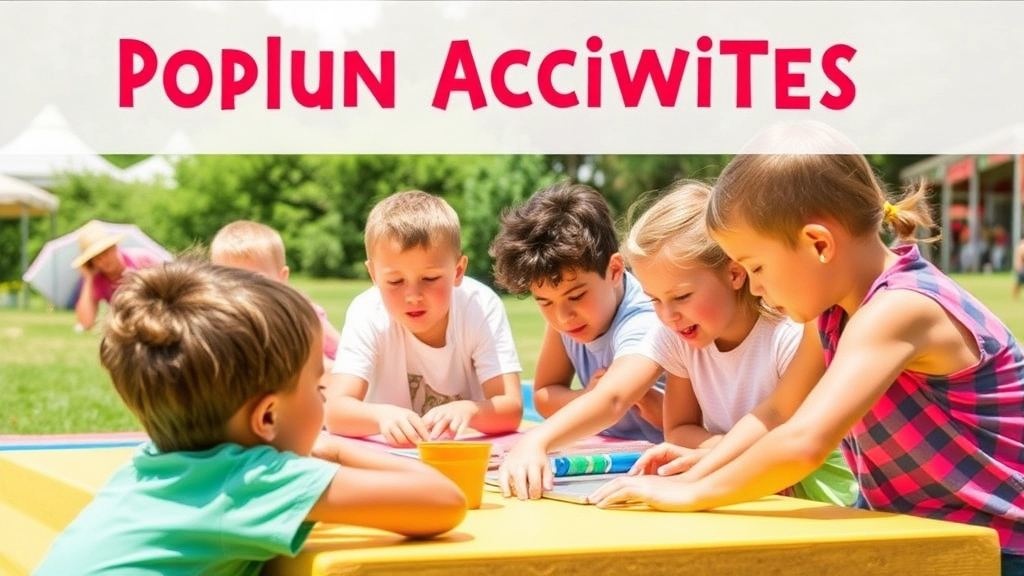
Ever wondered what your kid will actually do at summer camp?
I get it.
You’re thinking, “What if they get bored?” or “Will they make friends?”
Trust me, summer camps are packed with activities that keep kids engaged and excited.
Outdoor Adventures
First off, let’s talk about the great outdoors.
Kids get to:
- Hike through nature trails.
- Swim in lakes or pools.
- Camp under the stars.
These activities not only get them moving but also teach them to appreciate nature.
Sports and Games
Now, if your kid’s into sports, they’re in for a treat.
From football and basketball to tennis and archery, summer camps offer a range of sports.
And let’s not forget the classic camp games like capture the flag and tug-of-war.
Arts and Crafts
Not every kid is a sports enthusiast, and that’s okay.
Many camps have arts and crafts sessions where kids can:
- Paint and draw.
- Make friendship bracelets.
- Create pottery.
These activities let them express their creativity.
Performing Arts
Got a little performer at home?
Camps often have talent shows, drama workshops, and dance classes.
It’s a fantastic way for kids to build confidence and have fun.
Science and Nature Exploration
For the curious minds, there are activities like:
- Stargazing.
- Nature walks.
- Science experiments.
These activities spark curiosity and make learning fun.
Water Sports
If the camp is near a lake or has a pool, your kid can enjoy:
- Kayaking.
- Canoeing.
- Paddleboarding.
Water sports are a great way to cool off and have a blast.
Team-Building Activities
Camps also focus on building social skills.
Kids participate in team-building exercises that teach them:
- Cooperation.
- Communication.
- Leadership.
These are skills they’ll carry for life.
Evening Activities
Evenings at camp are special.
Think:
- Campfires with stories and songs.
- Night hikes to explore the nocturnal world.
- Talent shows where everyone gets to shine.
Why These Activities Matter
These activities aren’t just about having fun.
They help kids:
- Build confidence.
- Learn new skills.
- Make lifelong friends.
Benefits of Attending Summer Camps
Why Should You Send Your Kid to Summer Camp?
Let’s face it, the idea of sending your kid to summer camp can be nerve-wracking. You might be wondering, “Will they make friends? Will they be safe? Is it worth the money?” Trust me, I get it. But let’s break it down and talk about why summer camps can be a game-changer for your child.
Building Life Skills
Summer camps are like a crash course in life skills. Kids learn to:
- Communicate Effectively: They’re constantly interacting with peers and counselors.
- Problem-Solve: Whether it’s figuring out how to pitch a tent or resolving a disagreement, problem-solving becomes second nature.
- Become Independent: Away from home, kids learn to manage their daily routines and make decisions on their own.
Boosting Confidence
There’s something magical about conquering a challenge at camp. Whether it’s climbing a rock wall or performing in a talent show, these experiences can skyrocket a child’s self-esteem. They come back home with a newfound sense of “I can do this!”
Unplugging from Technology
In today’s digital age, kids are glued to screens. Summer camps offer a much-needed digital detox. They get to:
- Engage in Physical Activities: From hiking to swimming, the focus is on getting active.
- Connect with Nature: Being outdoors can be incredibly grounding and refreshing.
- Build Real Relationships: Without the distraction of phones, kids form deeper, more meaningful connections.
Fostering Social Skills
Camps are social melting pots. Kids from different backgrounds come together, and this diversity teaches them:
- Empathy and Understanding: They learn to appreciate different perspectives.
- Teamwork: Many activities require collaboration, teaching kids how to work effectively in a group.
- Conflict Resolution: Living in close quarters means they’ll inevitably face conflicts, but they’ll also learn how to resolve them.
Creating Lifelong Memories
Ask any camp alumni, and they’ll tell you about the unforgettable moments. Whether it’s a late-night campfire or a thrilling zip line ride, these memories stick with them for life. Plus, they often make friends who turn into lifelong buddies.
Physical Health Benefits
Let’s not forget the physical perks. Camps promote a healthy lifestyle:
- Daily Exercise: Activities like canoeing, archery, and soccer keep them moving.
- Balanced Diet: Many camps focus on nutritious meals, teaching kids the importance of a balanced diet.
Emotional and Mental Well-being
Being in a supportive, inclusive environment does wonders for a child’s mental health. They get to:
- Express Themselves: Through arts, crafts, and other creative outlets.
- Feel Valued: Counselors and peers offer constant encouragement and support.
- Reduce Stress: The break from academic pressures and social media is a mental breather.
For a comprehensive guide to finding the perfect camp, check out our guide to finding the perfect summer camp. And if your child is a sports enthusiast, explore our top summer sports camps for an unforgettable experience.
Summer Camp Traditions and Rituals
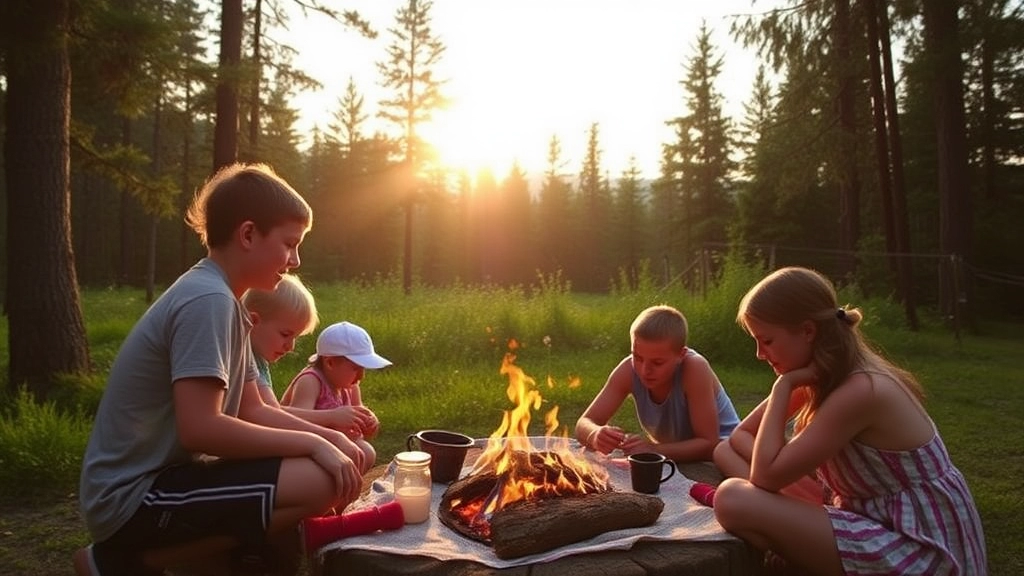
Ever wondered why summer camps feel so magical?
It’s all about the traditions and rituals.
These aren’t just random activities—they’re what make camp unforgettable.
Campfires and Songs
Picture this: everyone gathered around a roaring campfire.
The crackle of wood, the glow of the flames, and the sound of guitars.
Campfire songs are a staple.
They bring everyone together.
Some songs are silly, some are heartfelt, but all of them are memorable.
Morning Flag Ceremonies
Ever seen a flag ceremony at dawn?
It’s a powerful way to start the day.
Kids gather, the flag goes up, and everyone feels united.
It’s a tradition that teaches respect and patriotism.
Colour Wars
This isn’t your average game.
Colour Wars is the ultimate camp competition.
Teams are formed, colours are chosen, and the games begin.
It’s intense, fun, and builds camaraderie.
Secret Handshakes and Camp Names
Every camp has its own lingo.
Secret handshakes and camp names are part of the charm.
It’s like being in a secret club.
You’re not just a camper; you’re part of a legacy.
Talent Shows
Got a hidden talent?
Camp talent shows are your time to shine.
Whether it’s singing, dancing, or magic tricks, everyone gets a chance to showcase their skills.
The Final Night
The last night at camp is always special.
There’s usually a big ceremony or a slideshow of memories.
It’s a time to reflect and say goodbye.
You leave with a sense of accomplishment and a heart full of memories.
Why These Traditions Matter
So, why are these traditions so important?
They create a sense of belonging.
Kids feel like they’re part of something bigger.
They also build confidence and lifelong friendships.
Want to know more about summer camps? Check out our sections on Popular Activities at Summer Camps and Types of Summer Camps.
Types of Summer Camps: From Adventure to Arts
Ever wondered what kind of summer camp would be the best fit for your child? With so many options out there, it can feel overwhelming. But don’t sweat it; I’ve got you covered. Let’s break it down.
Adventure Camps: For the Thrill-Seekers
If your kid loves the great outdoors and craves excitement, adventure camps are a perfect match. These camps are all about:
- Hiking and Camping: Think long treks through forests and sleeping under the stars.
- Rock Climbing: Scaling cliffs and learning the ropesâliterally.
- Water Sports: Kayaking, canoeing, and maybe even white-water rafting.
Adventure camps are ideal for building resilience and teaching kids to push their boundaries. They offer a mix of physical challenges and life skills that stick around long after summer ends.
Arts Camps: For the Creatives
Got a budding artist or musician at home? Arts camps focus on nurturing creativity through various activities:
- Visual Arts: Painting, drawing, and sculpting.
- Performing Arts: Theatre, dance, and music.
- Crafts: Pottery, jewellery making, and more.
These camps are fantastic for kids who love to express themselves and want to hone their artistic talents. Plus, they often culminate in performances or exhibitions, giving your child a chance to shine.
Sports Camps: For the Athletes
If your child is all about sports, there are camps specifically designed to enhance their athletic skills. These camps typically offer:
- Specialised Training: Focused coaching in sports like football, basketball, or tennis.
- Team Building: Learning the importance of teamwork and sportsmanship.
- Fitness Programs: Strength and conditioning exercises.
Sports camps are great for improving physical fitness, boosting self-esteem, and developing a strong sense of discipline.
Science and Tech Camps: For the Future Innovators
For the curious minds who love to tinker and explore, science and tech camps are a goldmine. Activities include:
- Coding and Robotics: Building and programming robots.
- Astronomy: Stargazing and learning about the cosmos.
- Environmental Science: Exploring ecosystems and conducting experiments.
These camps are perfect for kids who are fascinated by how things work and want to dive deep into the world of science and technology.
Specialty Camps: For Unique Interests
There are also camps that cater to more niche interests. Some examples include:
- Horseback Riding Camps: For kids who love horses and want to learn riding skills.
- Cooking Camps: Teaching culinary skills and healthy eating habits.
- Language Immersion Camps: Perfect for kids wanting to learn a new language.
Specialty camps offer a focused environment where kids can dive deep into their specific interests and passions.
Combination Camps: Best of Both Worlds
Can’t decide on just one type? No problem. Some camps offer a mix of activities, giving kids a well-rounded experience. These combination camps might include:
- Morning Adventure Activities: Hiking or water sports.
- Afternoon Arts and Crafts: Painting or theatre workshops.
- Evening Social Events: Campfires, talent shows, and more.
Combination camps are great for kids who have diverse interests and want to try a bit of everything.
Choosing the Right Camp
So, how do you choose the right summer camp for your child? Here are a few tips:
- Identify Interests: What does your child enjoy doing the most?
- Set Goals: Are you looking for skill development, fun, or both?
- Research: Look for camps with good reviews and a solid reputation.
- Visit: If possible, visit the camp beforehand to get a feel for the environment.
Remember, the right summer camp can be a transformative experience for your child, offering not just fun but also valuable life skills and memories that last a lifetime.
The Role of Counsellors in Summer Camp Culture
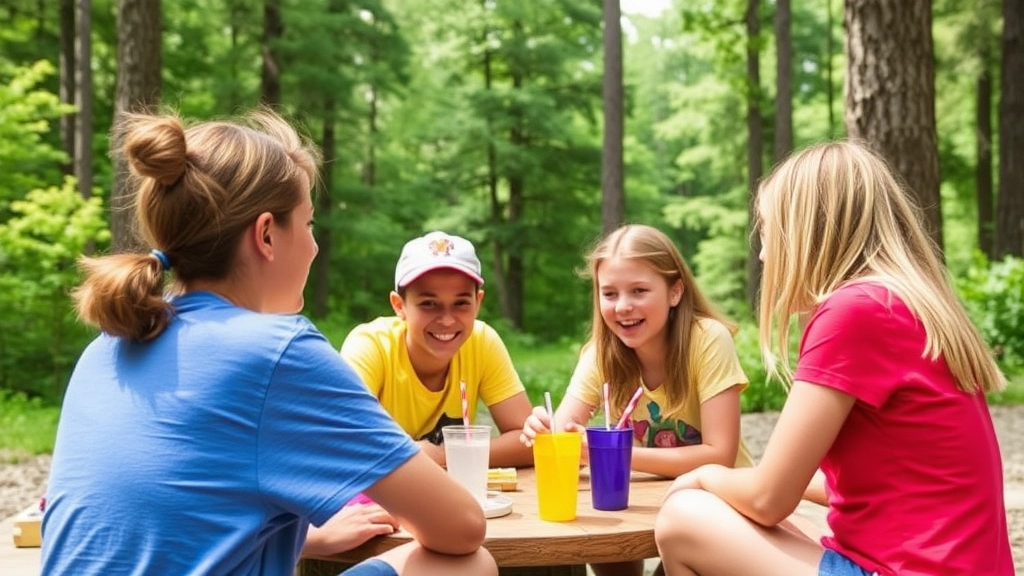
Ever wondered what makes a summer camp unforgettable? It’s the counsellors. These folks are the backbone of the entire camp experience.
What Do Summer Camp Counsellors Do?
Counsellors wear many hats. They’re mentors, friends, and sometimes, even heroes. Here’s a quick rundown of their roles:
- Supervisors: Keeping an eye on kids to ensure they’re safe and having fun.
- Activity Leaders: Running games, arts and crafts, and other camp activities.
- Role Models: Teaching kids valuable life skills and good behaviour.
- Problem Solvers: Handling any issues that come up, from homesickness to minor injuries.
Why Are Counsellors So Important?
The impact of a good counsellor can’t be overstated. They’re the ones who make sure your child feels welcomed and included. They create a positive environment where kids can thrive.
Real Stories from Camp
I remember my first summer camp counsellor, Sarah. She taught me how to canoe and always had a funny story to share. Thanks to her, I felt confident and made lifelong friends.
How Do They Keep the Magic Alive?
Counsellors have a few tricks up their sleeves:
- Ice-Breakers: Fun games to help kids get to know each other.
- Nightly Rituals: Campfires, songs, and storytelling to build a sense of community.
- One-on-One Time: Personal chats to make each camper feel special.
The Training Behind the Scenes
You might think anyone can be a counsellor, but there’s a lot of training involved. They learn:
- First Aid and Safety: To handle emergencies.
- Conflict Resolution: To mediate disputes.
- Activity Planning: To keep things fresh and exciting.
The Lasting Impact
A good counsellor does more than just supervise. They inspire and leave a lasting impression on your child’s life.
Summer Camp Food and Dining Hall Experiences
Alright, let’s talk about something everyone thinks about but rarely discusses openly: summer camp food. If you’re like most parents, you’re probably wondering, “Will my kid actually eat anything at camp?” or “Is it just going to be mystery meat and soggy vegetables?” Trust me, I’ve been there, and I’ve got you covered.
What to Expect in the Dining Hall
First off, let’s set the record straight. The days of questionable cafeteria food are long gone. Today’s summer camps are stepping up their game, offering meals that are not just edible but genuinely delicious. Think about it: kids are burning tons of energy during the day, so they need good fuel.
Variety is the Spice of Life
Most camps offer a range of options to cater to different tastes and dietary needs. Here’s what you can typically expect:
- Breakfast: Usually a hearty spread with options like scrambled eggs, pancakes, cereal, and fresh fruit. Some camps even offer yoghurt bars and smoothie stations.
- Lunch: Often a mix of hot and cold options. Sandwiches, salads, pasta, and sometimes even tacos or pizza make an appearance.
- Dinner: This is usually the main event. Expect dishes like roast chicken, spaghetti Bolognese, and vegetarian stir-fries. There’s often a dessert to round things off, like ice cream or fruit salad.
Special Dietary Needs? No Problem
Many camps are well-prepared to handle allergies and special dietary requirements. Gluten-free, dairy-free, vegetarian, and even vegan options are becoming standard. Always check with the camp beforehand to make sure they can accommodate your child’s needs.
Dining Hall Etiquette and Traditions
Now, let’s talk about the dining experience itself. The dining hall is more than just a place to eat; it’s a hub of social activity. Here are a few things your kid might encounter:
- Assigned Seating: Some camps have assigned seating to encourage kids to mingle and make new friends.
- Family-Style Dining: Many camps serve meals family-style, where dishes are passed around the table. This fosters a sense of community and teamwork.
- Meal-Time Songs: Yep, you read that right. Many camps have meal-time songs or chants to kick off the dining experience. It might sound cheesy, but it’s all part of the fun.
The Role of Camp Counselors
Camp counselors play a crucial role in the dining hall. They help manage the chaos, ensure everyone gets enough to eat, and often lead those quirky meal-time songs. Their presence makes the dining hall a safe and welcoming environment.
Stories from the Trenches
Let me share a quick story. I remember one summer when a kid named Jake was super picky. His parents were worried he wouldn’t eat anything. By the end of camp, Jake was not only eating but also trying new foods like sushi and quinoa salad. The camp environment really encouraged him to step out of his comfort zone.
If you’re curious about more summer camp experiences, check out the culture and traditions that make these camps so special. And for those interested in sports camps, our detailed guide on the top summer sports camps in Jacksonville is a must-read!
Impact of Technology on Summer Camp Experience
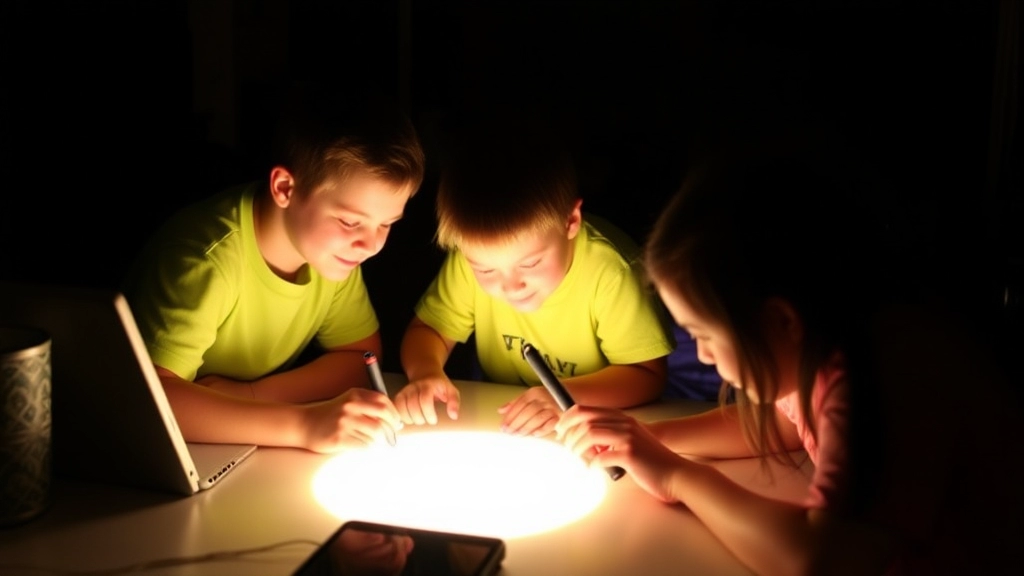
Ever wondered how tech is changing summer camps?
I bet you have.
Parents and kids alike are curious about how technology fits into the classic camp experience.
Will it ruin the magic?
Or enhance it?
Let’s dive in.
The Digital Dilemma
First off, technology at summer camps is a hot topic.
Some camps go tech-free.
Others embrace it.
But what’s the right balance?
Pros of Tech at Camp:
- Safety: GPS trackers and apps keep tabs on kids.
- Communication: Easier to stay in touch with family.
- Learning: Educational apps and online resources.
Cons of Tech at Camp:
- Distraction: Kids glued to screens miss out on nature.
- Dependency: Less face-to-face interaction.
- Overload: Camps lose their ‘unplugged’ charm.
Real Stories, Real Insights
I remember chatting with a camp director.
He told me about a kid who was glued to his phone.
Couldn’t last a day without it.
But after a week of tech-free activities?
He didn’t even miss it.
That’s the magic of camp.
Balancing Tech and Tradition
Here’s how some camps are striking a balance:
- Limited Screen Time: Phones allowed only during specific hours.
- Tech-Free Zones: Certain areas where gadgets are a no-go.
- Educational Tech: Using tablets for learning, not gaming.
What’s the Future?
Tech isn’t going anywhere.
But camps are getting smarter about it.
Future Trends:
- Virtual Reality: Imagine exploring nature in VR.
- Apps for Parents: Real-time updates and photos.
- Wearable Tech: Track health and activity levels.
Choosing the Right Camp
Worried about tech at camp?
Ask these questions:
- Tech Policy: What’s allowed and what’s not?
- Balance: How do they mix tech and traditional activities?
- Safety: How is tech used for safety and communication?
Technology can be a game-changer.
Or a distraction.
It all depends on how it’s used.
So, when you’re picking a camp, think about the tech balance.
Because the right mix can make all the difference.
How to Choose the Right Summer Camp for Your Child
Choosing the right summer camp for your child can feel like a big decision. What if they don’t like it? What if it doesn’t match their interests? Let’s dive into some real questions and worries you might have and break it down into simple steps.
What Are Your Child’s Interests?
Start by figuring out what your child loves. Are they into sports, arts, or maybe adventure? Matching the camp to their interests is key. Here’s how you can do it:
- Sports Camps: Perfect for active kids who love football, basketball, or swimming. For instance, check out the Top Volleyball Summer Camps in the USA.
- Arts Camps: Ideal for budding artists, musicians, or actors.
- Adventure Camps: Great for those who crave hiking, canoeing, or rock climbing. You might want to explore Bucolic Summer Camps for nature and adventure.
Location and Duration
Think about how far you’re willing to travel and how long the camp should last. Some kids are ready for a week away, while others might prefer day camps closer to home.
- Local Day Camps: Convenient and less overwhelming for first-timers.
- Overnight Camps: Offer a full immersive experience but require more readiness.
Budget Considerations
Let’s be realâsummer camps can be pricey. Set a budget and look for camps that offer financial aid or scholarships.
- Budget-Friendly Options: Check community centres or local organisations.
- Scholarships: Many camps offer financial assistance, so don’t hesitate to ask.
Safety and Accreditation
Safety is non-negotiable. Look for camps accredited by recognised bodies, which ensures they meet specific standards.
- Accreditation: Check for ACA (American Camp Association) or similar credentials.
- Staff Training: Ensure counselors are trained in first aid and child safety.
Word of Mouth and Reviews
Nothing beats hearing from other parents. Ask around or read online reviews to get an honest picture.
- Parent Testimonials: Talk to friends or neighbours.
- Online Reviews: Websites and social media can offer insights.
Visit the Camp
If possible, visit the camp beforehand. It’s a great way to get a feel for the environment and meet the staff.
- Camp Tours: Many camps offer open days or virtual tours.
- Meet the Staff: A chance to ask questions and see how they interact with kids.
Preparing Your Child
Once you’ve chosen the right camp, prepare your child for the adventure. Talk about what to expect and pack together.
- Packing List: Make sure they have everything they need.
- Expectations: Discuss daily routines and activities.
Stories and Testimonials from Summer Camp Alumni
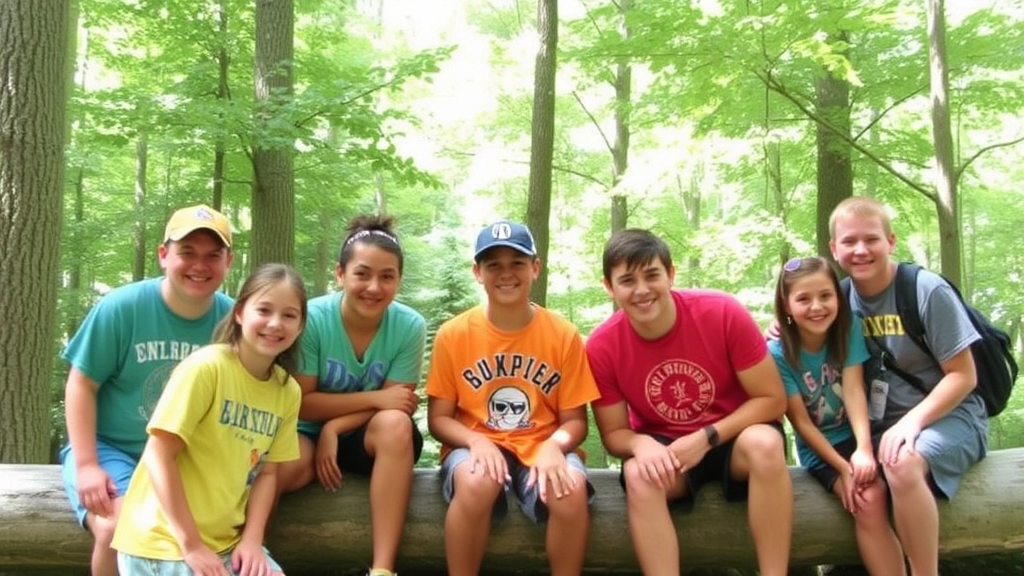
Ever wondered if summer camps are worth it?
Let’s dive into some real stories from folks who’ve been there.
“What if my kid hates it?”
That’s a big worry, right?
But listen to this.
Emma, 28, London:
“I was terrified of going to summer camp. First time away from home. But it turned out to be the best summer of my life. I made friends I still talk to today. We did everything from kayaking to arts and crafts. And the campfire stories? Unforgettable.”
“Will my child make friends?”
Absolutely, yes.
Tom, 35, Manchester:
“I was a shy kid. Not great at making friends. But camp changed that. There’s something about being in nature, away from screens, that brings people together. I learned to open up, and I’ve carried that confidence into my adult life.”
“Is it safe?”
Safety is a top priority.
Sarah, 40, Birmingham:
“As a parent, I was worried about safety. But when I saw the camp’s safety measures and met the counsellors, I felt reassured. My daughter came back with stories of night hikes and team-building games. She was safe and had the time of her life.”
Why these stories matter
These testimonials aren’t just feel-good tales.
They highlight the real benefits of summer camps.
Key takeaways:
- Confidence Boost: Kids come back more confident.
- Lifelong Friendships: They make friends for life.
- Life Skills: They learn new skills and independence.
- Safety First: Camps prioritise safety.
“Is it worth the money?”
Short answer: Yes.
James, 42, Edinburgh:
“I was sceptical about the cost. But seeing my son come back with new skills, new friends, and a newfound sense of independence? Priceless. It’s an investment in their growth.”
Real Stories, Real Impact
These testimonials show that summer camps offer more than just a break from school.
They provide experiences that shape lives.
Ready to make a decision?
Check out our guide on How to Choose the Right Summer Camp for Your Child.
Final Thoughts
Summer camps are more than just fun.
They’re transformative.
So, if you’re on the fence, take it from those who’ve been there.
The memories and skills your child gains will last a lifetime.
Wondering how to prepare your child for their first camp?
Read our Preparing Your Child for Their First Summer Camp guide for tips and tricks.
Remember, it’s not just a camp.
It’s a life-changing experience.
Preparing Your Child for Their First Summer Camp
Are you worried about sending your child to their first summer camp? Trust me, you’re not alone. As a parent, it’s natural to have a mix of excitement and anxiety about this big step. The good news? With a bit of prep, you can set your child up for an unforgettable experience.
Addressing Common Concerns
What if they get homesick? This is probably the number one concern for most parents. Homesickness is normal, but it’s manageable. Encourage your child by talking about all the fun activities they’ll be doing and the new friends they’ll make. Share stories from your own childhood to make it relatable.
What if they don’t like the food? Kids can be picky eaters, but most camps offer a variety of options. It’s a good idea to check the camp’s menu beforehand and discuss it with your child. If they have dietary restrictions, make sure the camp is aware and can accommodate them.
What should they pack? Packing can be a headache, but it doesn’t have to be. Most camps provide a packing list, but here’s a quick rundown:
- Clothing: Pack enough for the duration, plus a few extras. Think layers for varying weather.
- Toiletries: Don’t forget the essentials like toothpaste, soap, and a toothbrush.
- Special items: A favourite stuffed animal or a family photo can be comforting.
Building Independence
Summer camp is a great opportunity for your child to gain independence. Before they head off, teach them some basic skills:
- Making their bed: A simple task, but it builds a sense of responsibility.
- Personal hygiene: Ensure they know how to take care of themselves, like brushing their teeth and showering regularly.
- Managing money: If the camp has a tuck shop, give them a small amount of money and discuss budgeting.
Communication Plan
How will you stay in touch? Some camps have strict no-phone policies, while others allow limited use. Find out the camp’s rules and set expectations with your child. Letters and emails can be a great way to keep in touch without disrupting their camp experience.
Preparing for New Experiences
Talk to your child about trying new things. Whether it’s learning to swim, trying out arts and crafts, or participating in team sports, encourage them to step out of their comfort zone. Share a story from your own life where trying something new led to a positive experience.
Visiting the Camp
If possible, visit the camp beforehand. This can help alleviate any fears and make the environment more familiar. If a visit isn’t possible, many camps offer virtual tours or videos online.
Final Checklist
Before you send them off, run through this final checklist:
- Label everything: From clothes to toiletries, label it all to avoid mix-ups.
- Emergency contacts: Make sure the camp has all necessary contact information.
- Health forms: Ensure all medical forms are filled out and any medications are packed and clearly labelled.
Sending your child to their first summer camp can be nerve-wracking, but with the right preparation, it can be a fantastic experience for both of you. Remember, the goal is to help them grow, learn, and have fun. So, take a deep breath, follow these tips, and get ready to hear all about their amazing adventures when they return.
For more insights, check out our guide on summer camp activities and our list of top summer camps for teens.
Environmental and Sustainability Practices at Summer Camps
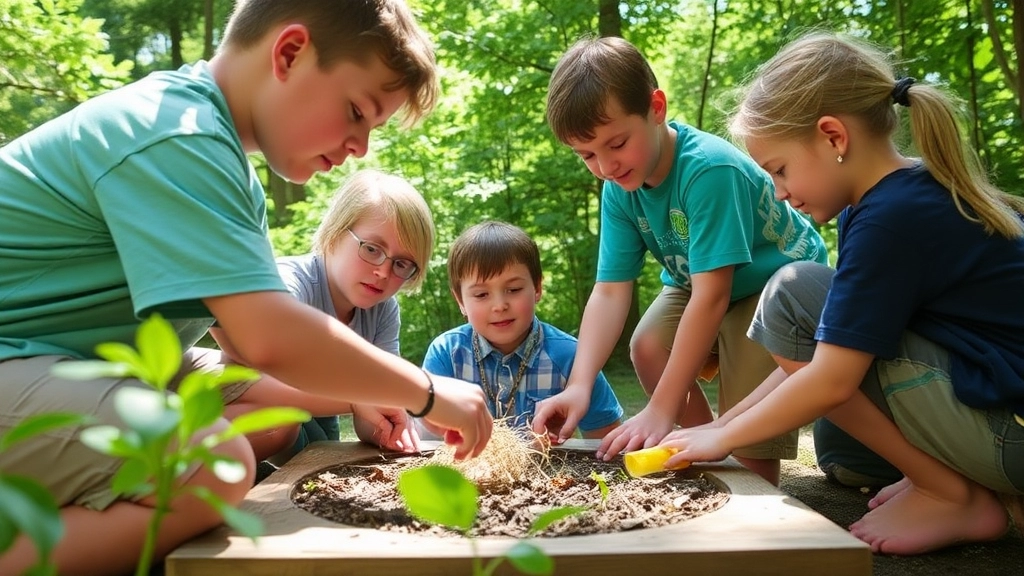
Worried about the environmental impact of sending your kid to summer camp?
I get it.
We all want our kids to have a blast without trashing the planet.
So, let’s dive into how summer camps are stepping up their eco-game.
Going Green: What Are Summer Camps Doing?
First off, many camps are all about sustainability now.
Here’s how they’re doing it:
- Recycling and Waste Management: Camps are setting up easy-to-use recycling stations. They’re also teaching kids about composting. It’s like a mini eco-lesson every day.
- Energy Use: Solar panels are popping up everywhere. Camps are cutting down on electricity use by switching to LED lights and energy-efficient appliances.
- Water Conservation: Low-flow showers and toilets are becoming the norm. Some camps even have rainwater collection systems.
- Local Food: More camps are sourcing food locally. Some even have their own gardens. Fresh veggies, anyone?
Real Stories: Camps Making a Difference
Let me tell you about Camp Green Tree.
They’ve cut their waste by 50% in just two years.
How?
- Reusable Dishware: No more plastic forks and paper plates. They’ve switched to reusable dishware.
- Eco-Friendly Activities: Kids learn to make bird feeders from recycled materials. They even have a “Trash to Treasure” art contest.
Why Should You Care?
Simple.
Teaching kids about sustainability now means they’ll carry those habits into adulthood.
Plus, it’s a great way to bond over something meaningful.
How to Choose an Eco-Friendly Camp
Here are some quick tips:
- Ask Questions: Don’t be shy. Ask camps about their sustainability practices.
- Check Certifications: Look for camps certified by eco-friendly organisations.
- Read Reviews: Other parents will spill the tea. Check online reviews for mentions of green practices.
The Future of Summer Camps: Trends and Innovations
Ever wondered what the future holds for summer camps?
With technology advancing and new trends emerging, summer camps are evolving in ways we couldn’t have imagined.
Let’s dive into the future of summer camps and see what’s in store.
Tech Integration: Balancing Screen Time
We all know kids love their gadgets.
But at summer camps, it’s about finding the right balance.
Key Trends:
- Digital Detox Zones: Areas where kids can escape screens and enjoy nature.
- Tech Workshops: Coding, robotics, and even drone flying. Tech can be educational and fun.
- Virtual Reality (VR): Imagine exploring ancient ruins or diving into the ocean, all while at camp.
Eco-Friendly Initiatives: Going Green
Parents and kids are more eco-conscious than ever.
Camps are stepping up their game to be more sustainable.
Eco Trends:
- Solar-Powered Facilities: Reducing carbon footprints.
- Zero-Waste Policies: Teaching kids the importance of recycling and composting.
- Organic Gardens: Camps growing their own food, teaching kids about farming and healthy eating.
Specialised Camps: Tailoring Experiences
Gone are the days of one-size-fits-all camps.
Now, there’s something for everyone.
Specialised Camps:
- STEM Camps: For the budding scientists and engineers.
- Arts Camps: Focusing on drama, music, or visual arts.
- Adventure Camps: Rock climbing, kayaking, and survival skills.
Mental Health Focus: Nurturing Well-being
With rising awareness about mental health, camps are creating supportive environments.
Mental Health Initiatives:
- Mindfulness Sessions: Yoga, meditation, and breathing exercises.
- Counselling Services: On-site counsellors for kids who need someone to talk to.
- Workshops: Teaching resilience, coping skills, and emotional intelligence.
Global Connections: Cultural Exchange
Kids today are global citizens.
Camps are fostering international friendships and understanding.
Global Trends:
- Cultural Exchange Programs: Kids from different countries sharing experiences.
- Language Immersion: Learning new languages through fun activities.
- Global Issues Workshops: Discussing climate change, human rights, and more.
Stories from the Trenches
Remember that time your mate told you about a camp where they learned to build robots?
Or the one where they made lifelong friends from another country?
These stories aren’t just anecdotes; they’re the future of summer camps.
FAQs About Summer Camp Culture
What activities do kids participate in at summer camps?
Summer camps offer a wide range of activities to keep kids engaged and excited. These include outdoor adventures like hiking and camping, sports and games such as football and archery, arts and crafts, performing arts, science and nature exploration, water sports, team-building activities, and special evening events like campfires and talent shows.
How do summer camp traditions and rituals impact the experience?
Traditions and rituals like campfires, morning flag ceremonies, Colour Wars, secret handshakes, and the final night ceremony create a magical and unforgettable camp experience. These activities foster a sense of belonging, build confidence, and help kids form lifelong friendships.
What role do counsellors play in summer camp culture?
Camp counsellors are essential to the camp experience. They supervise kids, lead activities, serve as role models, and handle any issues that arise. Their training includes first aid, conflict resolution, and activity planning, ensuring a safe and enriching environment for campers.
How is technology integrated into the summer camp experience?
The role of technology at summer camps varies. Some camps go tech-free, while others incorporate tech for safety, communication, and learning. Camps strive to find a balance, offering limited screen time, tech-free zones, and educational tech to enhance the camp experience without detracting from traditional activities.
What are some real stories from summer camp alumni?
Alumni testimonials highlight the transformative impact of summer camps. Stories often mention increased confidence, lifelong friendships, learning new skills, and the overall positive experience. These real-life accounts demonstrate the lasting benefits of attending summer camp.
Are summer camps environmentally friendly?
Many summer camps are adopting sustainability practices to minimize their environmental impact. These include recycling and waste management, energy conservation through solar panels and LED lights, water conservation with low-flow fixtures, and sourcing local food. Camps like Camp Green Tree are leading the way by significantly reducing waste and promoting eco-friendly activities.
How can I choose an eco-friendly summer camp?
To select an eco-friendly camp, ask about their sustainability practices, look for certifications from eco-friendly organizations, and read reviews from other parents. Camps that prioritize environmental practices often provide a more conscientious and enriching experience for kids.
Is summer camp worth the cost?
Many parents find that the benefits of summer camp—such as increased confidence, new friendships, and valuable life skills—make it a worthwhile investment. Testimonials from parents and alumni often emphasize the positive, lasting impact of the camp experience.
How can I prepare my child for their first summer camp?
Preparing your child for their first camp involves discussing what to expect, packing appropriate gear, and encouraging them to embrace new experiences. For detailed tips, refer to guides on preparing for summer camp to ensure your child is ready for this transformative adventure.
References
-
Popular Summer Camp Activities
-
Summer Camp Traditions
-
The Role of Camp Counselors

